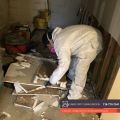Mold in Commercial Properties: Rights and Responsibilities for Renters and Landlords

Mold in commercial properties can lead to serious health issues, structural damage, and legal disputes. For both landlords and renters, understanding their rights and responsibilities is essential for managing mold issues in commercial spaces. Mold growth in places like offices, retail spaces, and industrial buildings can affect indoor air quality and the well-being of employees, customers, and visitors. Addressing mold issues early and effectively is critical to maintaining a safe and healthy environment, as well as avoiding potential legal complications.
Bay Area Mold Pros, a trusted name in mold inspection and testing, specializes in helping property owners, renters, and landlords navigate these challenges by offering expert consulting services. In this article, we’ll explore the rights and responsibilities of both parties when it comes to mold in commercial properties, as well as the importance of mold testing during property transactions.
Renters’ Rights and Responsibilities
Renters, including businesses leasing office or retail space, have a right to a safe and habitable working environment. This includes indoor spaces that are free from excessive mold growth. Mold can have serious health effects, particularly for individuals with respiratory issues or allergies. However, it’s important for renters to understand their responsibilities in preventing mold and their rights when mold issues arise.
- Rights
- Right to a Safe Environment: Renters have the right to a mold-free environment. If mold is detected and is affecting the health or safety of employees or customers, renters can request the landlord to address the issue. If the landlord fails to act, renters may have the legal right to withhold rent, break the lease, or pursue legal action, depending on the severity of the mold problem and local laws.
- Right to Notification: In some cases, landlords are required to notify tenants of known mold issues. This is particularly important if mold is discovered in shared spaces such as HVAC systems or common areas.
- Responsibilities
- Proper Ventilation: Renters are responsible for maintaining adequate ventilation in their leased spaces. This includes using fans, dehumidifiers, or other means to prevent excess moisture buildup in bathrooms, kitchens, or other high-humidity areas.
- Reporting Mold: If mold is noticed, renters should promptly notify the landlord in writing. This ensures there is a record of the complaint, and the landlord can take appropriate action.
- General Upkeep: Renters should also ensure that any leaks or water damage is reported immediately, as delaying repairs can exacerbate mold growth.
Landlords’ Rights and Responsibilities
Landlords and property owners play a key role in ensuring that commercial spaces are well-maintained and safe from mold. Failing to address mold problems can result in legal liabilities, loss of tenants, and costly repairs.
- Responsibilities
- Maintenance and Repairs: Landlords are responsible for maintaining the property, including preventing conditions that lead to mold growth. This includes fixing leaks, ensuring proper drainage, and maintaining the HVAC system.
- Mold Remediation: If mold is discovered, landlords are typically responsible for addressing the issue, especially if it results from structural problems like roof leaks, plumbing issues, or poor ventilation. Professional mold remediation should be conducted to ensure that the mold is completely removed and does not return.
- Disclosure: In many jurisdictions, landlords must disclose any existing mold problems to prospective tenants. Failing to do so can result in legal action if tenants suffer health problems as a result of the undisclosed mold.
- Rights
- Access for Inspections and Repairs: Landlords have the right to access the property to conduct inspections or make repairs, as long as they provide proper notice to the tenant. This is particularly important when mold issues are reported, as immediate action is often necessary to prevent further damage.
- Responsibility for Tenant Actions: If a tenant's neglect or improper actions contribute to mold growth (e.g., failing to ventilate the space or not reporting leaks), the landlord may not be held fully liable for mold remediation costs. In such cases, the landlord can charge the tenant for repairs caused by their actions.
Mold Testing in Commercial Property Transactions
Mold testing is a crucial part of any commercial property transaction, whether you’re buying, selling, or leasing a commercial space. Mold can affect the value of a property and can become a source of disputes between buyers, sellers, landlords, and tenants. Professional mold testing helps all parties involved identify potential issues early and avoid surprises after the transaction is completed.
Why Mold Testing Matters During Transactions:
- Ensures Transparency
- Conducting mold tests before a transaction ensures that buyers, sellers, and tenants are aware of any mold problems that might affect the value of the property or the health of its occupants. This transparency helps avoid disputes later on.
- Protects All Parties
- Mold can lead to expensive remediation costs, especially if it has spread into structural components of the building. By conducting thorough mold inspections, property buyers or lessees can negotiate repair costs or request remediation before closing a deal.
- Complies with Legal Standards
- Some states and local jurisdictions require mold testing and disclosure as part of commercial property transactions. For example, commercial property owners in the Bay Area must comply with strict building codes related to moisture control and mold prevention. Failing to comply with these requirements could result in legal action.
The Role of Bay Area Mold Pros in Commercial Mold Management
Bay Area Mold Pros, led by certified mold inspector Rick Bruce, offers professional and unbiased mold testing and inspection services for commercial properties. Their expertise helps property owners, landlords, and renters identify mold issues before they become significant problems. By providing impartial mold testing (without remediation services), Bay Area Mold Pros ensures that their assessments are unbiased and geared solely toward identifying and managing mold.
Key services include:
- Comprehensive Mold Inspections: Using advanced technology, the team can detect hidden mold in commercial properties.
- Air and Surface Testing: Mold spores are often invisible to the naked eye. Bay Area Mold Pros conducts thorough air and surface testing to ensure that all mold issues are detected.
- Detailed Reporting: After testing, property owners receive a detailed report outlining the findings and recommendations for managing any mold-related issues.
Conclusion
Managing mold in commercial properties is a shared responsibility between landlords and renters. Renters have the right to a safe, mold-free environment, while landlords must take the necessary steps to maintain their properties and address mold problems promptly. Mold testing is also essential during property transactions, ensuring that all parties are aware of potential issues before finalizing a deal. By working with trusted professionals like Bay Area Mold Pros, property owners can ensure the long-term safety and value of their commercial spaces.
For professional mold inspection and testing services, contact Bay Area Mold Pros at (650) 762-6228 or visit Bay Area Mold Pros to request an inspection today.







